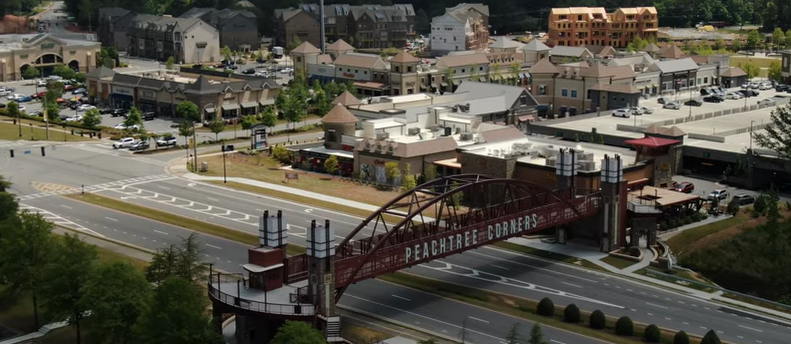Peachtree Corners is a suburban city located in Gwinnett County, Georgia, and has a population of approximately 43,000. Here are some of the pros and cons of living in Peachtree Corners:
PROS:
Great location: Peachtree Corners is located in the heart of Gwinnett County, which is a fast-growing and dynamic area with plenty of job opportunities and great schools. It is situated in the northeast corner of metro Atlanta, which is one of the fastest-growing areas in the country. It’s close to major highways like I-285, I-85, and GA-400, making it easy to commute to other parts of Atlanta for work or leisure activities.
In addition to being close to major highways, Peachtree Corners is also located near many popular destinations in the Atlanta metro area. For example, the city is only a short drive away from the upscale shopping and dining in Buckhead, the sports and entertainment options in downtown Atlanta, and the natural beauty of the North Georgia mountains. The city is also close to popular destinations like the Georgia Aquarium, Stone Mountain Park, and Lake Lanier.
Good schools: Peachtree Corners has some of the best schools in the state, including Peachtree Corners High School, Paul Duke STEM High School, and Wesleyan School. For example, Peachtree Corners High School is a new state-of-the-art facility that offers students innovative learning opportunities in fields like robotics, engineering, and healthcare. Peachtree Corners’ schools consistently rank among the top in the state.
Peachtree Corners is served by the Gwinnett County Public Schools system, which includes several highly-rated schools. For example, Peachtree Elementary School, Simpson Elementary School, and Norcross High School have all received high marks from GreatSchools.org.
Good quality of life: Peachtree Corners is a safe and family-friendly community with a high quality of life. It has great parks, trails, and recreational facilities. Peachtree Corners has a high quality of life, thanks to its abundant green space and recreational amenities. For example, the city has the Peachtree Corners Town Center, which includes a variety of shops, restaurants, and entertainment options. The city also has several parks, including Jones Bridge Park, which has a boat ramp and fishing pier, and Simpsonwood Park, which has trails for hiking and biking.
Peachtree Corners’ commitment to green space and recreation is evident in its many parks, trails, and facilities. For example, the city has a popular indoor aquatic center, a skate park, and a dog park, as well as numerous sports fields and courts.
Diverse community: Peachtree Corners has a diverse population, with people from different ethnicities and cultures living together. This creates a vibrant cultural atmosphere and offers opportunities to learn about different cultures and perspectives. Peachtree Corners’ diversity is reflected in its many cultural festivals and events throughout the year, such as the annual International Festival and the Lunar New Year celebration. The city hosts several events throughout the year that celebrate this diversity, including the Peachtree Corners Festival, which features music, food, and arts and crafts from around the world.
Economic growth: Peachtree Corners is a thriving business community, with many large corporations and small businesses located in the area. For example, the city has a growing technology sector and is home to companies like Tech Alpharetta, a tech incubator that helps startups grow and thrive.
Peachtree Corners has a strong business environment, thanks in part to its proximity to major corporations like NCR and State Farm. The city has also invested in innovative projects like its Curiosity Lab, a 5G-enabled smart city living lab that allows companies to test and develop new technologies in a real-world environment.
CONS:
Traffic: Like many cities in the Atlanta metro area, traffic can be a challenge in Peachtree Corners during rush hour. Commutes to and from work can take longer than expected, particularly on major thoroughfares like Peachtree Parkway and Holcomb Bridge Road.
Peachtree Corners is located near several major highways, but the area can be congested during peak hours. For example, the intersection of Peachtree Parkway and Holcomb Bridge Road is known for its heavy traffic. The city has made efforts to address this issue, including the installation of intelligent traffic systems, but traffic remains a concern for many residents.
Cost of living: The cost of living in Peachtree Corners is higher than the national average, particularly when it comes to housing. According to Zillow, the median home value in Peachtree Corners is $479,000, which is significantly higher than the Georgia median of $222,000. In addition to high housing costs, Peachtree Corners’ overall cost of living is higher than the national average. This can make it difficult for some families and individuals to afford to live in the area.
Limited public transportation: Peachtree Corners has limited public transportation options, and most residents rely on cars to get around. While Peachtree Corners is serviced by a few local bus routes, it lacks the extensive public transportation options found in other parts of Atlanta. Peachtree Corners is serviced by a few local bus routes, but there is no direct access to the MARTA rail system.
Weather: Summers in Peachtree Corners can be hot and humid, with frequent thunderstorms. Winters are mild, but occasional ice storms can cause problems on the roads. Thunderstorms are common during the summer months, which can sometimes lead to flash flooding. While Georgia’s mild climate is generally considered a pro, Peachtree Corners’ location in the humid subtropical zone means that residents can experience high humidity, thunderstorms, and occasional tornadoes during the spring and summer months.
Lack of nightlife: Peachtree Corners is a quiet suburb, and there are limited options for nightlife or entertainment outside of family-oriented activities. While there are some restaurants and bars in the area, the nightlife scene is not as vibrant as other parts of Atlanta. While the city has several family-friendly entertainment options, such as the Hudgens Center for the Arts and the Southeastern Railway Museum, the nightlife scene is limited.
